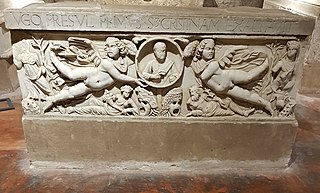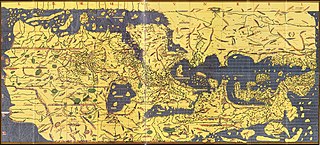
Roger II was King of Sicily and Africa, son of Roger I of Sicily and successor to his brother Simon. He began his rule as Count of Sicily in 1105, became Duke of Apulia and Calabria in 1127, then King of Sicily in 1130 and King of Africa in 1148. By the time of his death at the age of 58, Roger had succeeded in uniting all the Norman conquests in Italy into one kingdom with a strong centralized government.

Roger I, nicknamed Roger Bosso and The Great, was a Norman nobleman who became the first Count of Sicily from 1071 to 1101. He was a member of the House of Hauteville, and his descendants in the male line continued to rule Sicily down to 1194.

Tancred was King of Sicily from 1189 to 1194. He was born in Lecce an illegitimate son of Roger III, Duke of Apulia by his mistress Emma, a daughter of Achard II, Count of Lecce. He inherited the title "Count of Lecce" from his grandfather and is consequently often referred to as Tancred of Lecce. Due to his short stature and unhandsome visage, he was mocked by his critics as "The Monkey King".
William I, called the Bad or the Wicked, was the second king of Sicily, ruling from his father's death in 1154 to his own in 1166. He was the fourth son of Roger II and Elvira of Castile.

The Kingdom of Sicily was a state that existed in the south of the Italian Peninsula and for a time the region of Ifriqiya from its founding by Roger II of Sicily in 1130 until 1816. It was a successor state of the County of Sicily, which had been founded in 1071 during the Norman conquest of the southern peninsula. The island was divided into three regions: Val di Mazara, Val Demone and Val di Noto.

Roger Borsa was the Norman Duke of Apulia and Calabria and effective ruler of southern Italy from 1085 until his death.

The Duchy of Gaeta was an early medieval state centered on the coastal South Italian city of Gaeta. It began in the early ninth century as the local community began to grow autonomous as Byzantine power lagged in the Mediterranean and the peninsula due to Lombard and Saracen incursions.

The Emirate of Sicily was an Islamic kingdom that ruled the island of Sicily from 831 to 1091. Its capital was Palermo, which during this period became a major cultural and political center of the Muslim world.
Gilbert was a Norman Count of Gravina from 1159 until 1167. His father Bertrand was the illegitimate son of Rotrou III, Count of Perche. He was a cousin of Margaret of Navarre, the queen of Sicily. He arrived in Sicily sometime around 1159 and, through Margaret's influence, was created Count of Gravina in Apulia immediately.
The Treaty of Benevento or Concordat of Benevento was an important treaty between the papacy of Adrian IV and the Norman Kingdom of Sicily. After years of turbulent relations, the popes finally settled down to a peace with the Hauteville kings.

Andrew, count of Rupecanina, was a Norman nobleman of the Mezzogiorno. He was a longtime adversary of the royal power.

Hugh was the Archbishop of Capua in the late 1140s and Archbishop of Palermo from 1150 until his death, probably in 1165–66.

The Norman conquest of southern Italy lasted from 999 to 1139, involving many battles and independent conquerors.

Wars between the Normans and the Byzantine Empire were fought from c. 1040 until 1185, when the last Norman invasion of the Byzantine Empire was defeated. At the end of the conflict, neither the Normans nor the Byzantines could boast much power, as by the mid-13th century exhaustive fighting with other powers had weakened both, leading to the Byzantines losing Asia Minor to the Ottoman Empire in the 15th century, and the Normans losing Sicily to the Hohenstaufen.

The term Norman–Arab–Byzantine culture, Norman-Sicilian culture or, less inclusively, Norman–Arab culture, refers to the interaction of the Norman, Latin, Arab and Byzantine Greek cultures following the Norman conquest of Sicily and of Norman Africa from 1061 to around 1250. The civilization resulted from numerous exchanges in the cultural and scientific fields, based on the tolerance shown by the Normans towards the Greek-speaking populations and the Muslim settlers. As a result, Sicily under the Normans became a crossroad for the interaction between the Norman and Latin Catholic, Byzantine–Orthodox and Arab–Islamic cultures.

The Normans were a population arising in the medieval Duchy of Normandy from the intermingling between Norse Viking settlers and indigenous West Franks and Gallo-Romans. The term is also used to denote emigrants from the duchy who conquered other territories such as England and Sicily. The Norse settlements in West Francia followed a series of raids on the French northern coast mainly from Denmark, although some also sailed from Norway and Sweden. These settlements were finally legitimized when Rollo, a Scandinavian Viking leader, agreed to swear fealty to King Charles III of West Francia following the siege of Chartres in 911. The intermingling in Normandy produced an ethnic and cultural "Norman" identity in the first half of the 10th century, an identity which continued to evolve over the centuries.

The County of Apulia and Calabria, later the Duchy of Apulia and Calabria, was a Norman state founded by William of Hauteville in 1042 in the territories of Gargano, Capitanata, Apulia, Vulture, and most of Campania. It became a duchy when Robert Guiscard was raised to the rank of duke by Pope Nicholas II in 1059.
Events during the year 1156 in Italy.

The Kingdom of Africa was an extension of the frontier zone of the Siculo-Norman state in the former Roman province of Africa, corresponding to Tunisia and parts of Algeria and Libya today. The main primary sources for the kingdom are Arabic (Muslim); the Latin (Christian) sources are scanter.

Jordan Lupin was the first count of Bovino in the Norman kingdom of Sicily. He played a major role in the final years of Norman rule and first years of the Staufer dynasty. Twice he was involved in opposing crusader armies passing through Sicily. In the second instance, he led a revolt, apparently in the hope of seizing the throne. He was successful in attracting significant support, and was even crowned anti-king, but was ultimately captured and executed.














